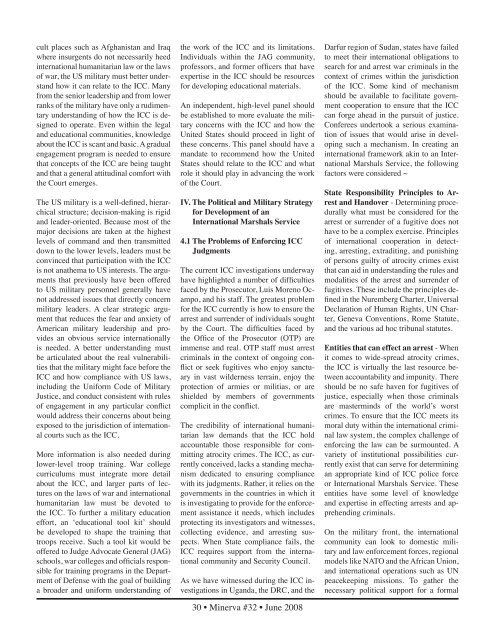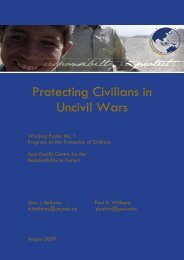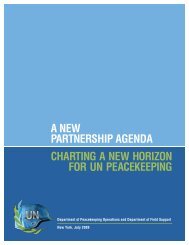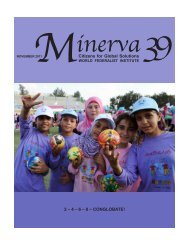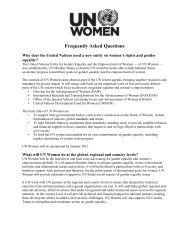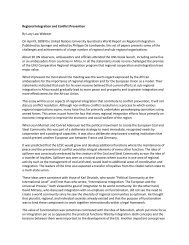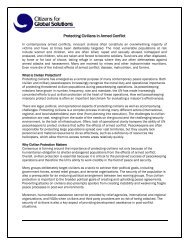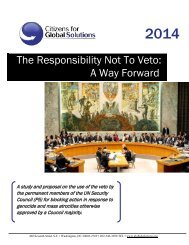Minerva, Spring 2008 (Volume 32) - Citizens for Global Solutions
Minerva, Spring 2008 (Volume 32) - Citizens for Global Solutions
Minerva, Spring 2008 (Volume 32) - Citizens for Global Solutions
Create successful ePaper yourself
Turn your PDF publications into a flip-book with our unique Google optimized e-Paper software.
cult places such as Afghanistan and Iraq<br />
where insurgents do not necessarily heed<br />
international humanitarian law or the laws<br />
of war, the US military must better understand<br />
how it can relate to the ICC. Many<br />
from the senior leadership and from lower<br />
ranks of the military have only a rudimentary<br />
understanding of how the ICC is designed<br />
to operate. Even within the legal<br />
and educational communities, knowledge<br />
about the ICC is scant and basic. A gradual<br />
engagement program is needed to ensure<br />
that concepts of the ICC are being taught<br />
and that a general attitudinal com<strong>for</strong>t with<br />
the Court emerges.<br />
The US military is a well-defined, hierarchical<br />
structure; decision-making is rigid<br />
and leader-oriented. Because most of the<br />
major decisions are taken at the highest<br />
levels of command and then transmitted<br />
down to the lower levels, leaders must be<br />
convinced that participation with the ICC<br />
is not anathema to US interests. The arguments<br />
that previously have been offered<br />
to US military personnel generally have<br />
not addressed issues that directly concern<br />
military leaders. A clear strategic argument<br />
that reduces the fear and anxiety of<br />
American military leadership and provides<br />
an obvious service internationally<br />
is needed. A better understanding must<br />
be articulated about the real vulnerabilities<br />
that the military might face be<strong>for</strong>e the<br />
ICC and how compliance with US laws,<br />
including the Uni<strong>for</strong>m Code of Military<br />
Justice, and conduct consistent with rules<br />
of engagement in any particular conflict<br />
would address their concerns about being<br />
exposed to the jurisdiction of international<br />
courts such as the ICC.<br />
More in<strong>for</strong>mation is also needed during<br />
lower-level troop training. War college<br />
curriculums must integrate more detail<br />
about the ICC, and larger parts of lectures<br />
on the laws of war and international<br />
humanitarian law must be devoted to<br />
the ICC. To further a military education<br />
ef<strong>for</strong>t, an ‘educational tool kit’ should<br />
be developed to shape the training that<br />
troops receive. Such a tool kit would be<br />
offered to Judge Advocate General (JAG)<br />
schools, war colleges and officials responsible<br />
<strong>for</strong> training programs in the Department<br />
of Defense with the goal of building<br />
a broader and uni<strong>for</strong>m understanding of<br />
the work of the ICC and its limitations.<br />
Individuals within the JAG community,<br />
professors, and <strong>for</strong>mer officers that have<br />
expertise in the ICC should be resources<br />
<strong>for</strong> developing educational materials.<br />
An independent, high-level panel should<br />
be established to more evaluate the military<br />
concerns with the ICC and how the<br />
United States should proceed in light of<br />
these concerns. This panel should have a<br />
mandate to recommend how the United<br />
States should relate to the ICC and what<br />
role it should play in advancing the work<br />
of the Court.<br />
IV. The Political and Military Strategy<br />
<strong>for</strong> Development of an<br />
International Marshals Service<br />
4.1 The Problems of En<strong>for</strong>cing ICC<br />
Judgments<br />
The current ICC investigations underway<br />
have highlighted a number of difficulties<br />
faced by the Prosecutor, Luis Moreno Ocampo,<br />
and his staff. The greatest problem<br />
<strong>for</strong> the ICC currently is how to ensure the<br />
arrest and surrender of individuals sought<br />
by the Court. The difficulties faced by<br />
the Office of the Prosecutor (OTP) are<br />
immense and real. OTP staff must arrest<br />
criminals in the context of ongoing conflict<br />
or seek fugitives who enjoy sanctuary<br />
in vast wilderness terrain, enjoy the<br />
protection of armies or militias, or are<br />
shielded by members of governments<br />
complicit in the conflict.<br />
The credibility of international humanitarian<br />
law demands that the ICC hold<br />
accountable those responsible <strong>for</strong> committing<br />
atrocity crimes. The ICC, as currently<br />
conceived, lacks a standing mechanism<br />
dedicated to ensuring compliance<br />
with its judgments. Rather, it relies on the<br />
governments in the countries in which it<br />
is investigating to provide <strong>for</strong> the en<strong>for</strong>cement<br />
assistance it needs, which includes<br />
protecting its investigators and witnesses,<br />
collecting evidence, and arresting suspects.<br />
When State compliance fails, the<br />
ICC requires support from the international<br />
community and Security Council.<br />
As we have witnessed during the ICC investigations<br />
in Uganda, the DRC, and the<br />
30 • <strong>Minerva</strong> #<strong>32</strong> • June <strong>2008</strong><br />
Darfur region of Sudan, states have failed<br />
to meet their international obligations to<br />
search <strong>for</strong> and arrest war criminals in the<br />
context of crimes within the jurisdiction<br />
of the ICC. Some kind of mechanism<br />
should be available to facilitate government<br />
cooperation to ensure that the ICC<br />
can <strong>for</strong>ge ahead in the pursuit of justice.<br />
Conferees undertook a serious examination<br />
of issues that would arise in developing<br />
such a mechanism. In creating an<br />
international framework akin to an International<br />
Marshals Service, the following<br />
factors were considered ~<br />
State Responsibility Principles to Arrest<br />
and Handover - Determining procedurally<br />
what must be considered <strong>for</strong> the<br />
arrest or surrender of a fugitive does not<br />
have to be a complex exercise. Principles<br />
of international cooperation in detecting,<br />
arresting, extraditing, and punishing<br />
of persons guilty of atrocity crimes exist<br />
that can aid in understanding the rules and<br />
modalities of the arrest and surrender of<br />
fugitives. These include the principles defined<br />
in the Nuremberg Charter, Universal<br />
Declaration of Human Rights, UN Charter,<br />
Geneva Conventions, Rome Statute,<br />
and the various ad hoc tribunal statutes.<br />
Entities that can effect an arrest - When<br />
it comes to wide-spread atrocity crimes,<br />
the ICC is virtually the last resource between<br />
accountability and impunity. There<br />
should be no safe haven <strong>for</strong> fugitives of<br />
justice, especially when those criminals<br />
are masterminds of the world’s worst<br />
crimes. To ensure that the ICC meets its<br />
moral duty within the international criminal<br />
law system, the complex challenge of<br />
en<strong>for</strong>cing the law can be surmounted. A<br />
variety of institutional possibilities currently<br />
exist that can serve <strong>for</strong> determining<br />
an appropriate kind of ICC police <strong>for</strong>ce<br />
or International Marshals Service. These<br />
entities have some level of knowledge<br />
and expertise in effecting arrests and apprehending<br />
criminals.<br />
On the military front, the international<br />
community can look to domestic military<br />
and law en<strong>for</strong>cement <strong>for</strong>ces, regional<br />
models like NATO and the African Union,<br />
and international operations such as UN<br />
peacekeeping missions. To gather the<br />
necessary political support <strong>for</strong> a <strong>for</strong>mal


